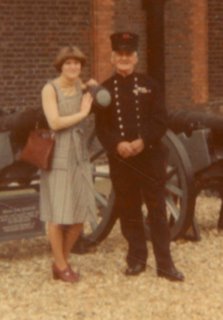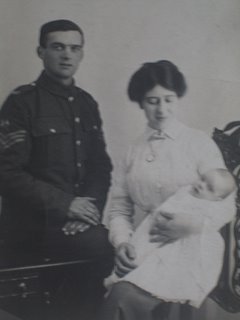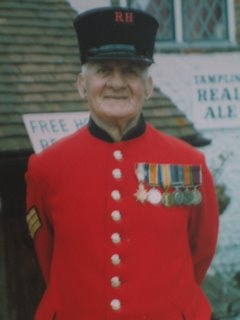Thursday, February 16, 2006
Wednesday, February 15, 2006
Revisiting the rosary story
 Last August I posted about the run up to Mons and the rosary given to Walter by the Mother Superior of a convent near Cuesmes. I'm working on that part of his story right now, so the details are roiling around in my head of late.
Last August I posted about the run up to Mons and the rosary given to Walter by the Mother Superior of a convent near Cuesmes. I'm working on that part of his story right now, so the details are roiling around in my head of late.When I was in England last year, I found a terrific resource at the National Army Museum. A day-by-day accounting of the Lincolnshire Regiment during World War I documented actions and events of the troops and filled in a lot of gaps in Walter's story for me. And knowing Walter's experience with the Mother Superior, I found Simpson's inclusion about the "rather picturesque incident" with the nuns particularly interesting.
Here are a few of my notes from the Simpson book:
From The History of the Lincolnshire Regiment 1914-1918, edited by Major-general C.R. Simpson, The Medici Society LTD, 1951, London.
Mons. At 4am on 22nd orders were issued from Brigade HQ to continue the march northwards . . . It is somewhere about 7am when the 1st Lincs set out along the Blaregnies-Frameries road, from Riez de l’Erelle. They had been about an hour on the way when the Obelisk which marks the side of the Battle of Malplaquet came into view . . . 9th Brigade HQ, two companies of Northumberland Fusiliers, 1st Lincs Transport B, 23rd Bridge RFA, and ammunition column, however, moved to Cuesmes in reserve. (p7)
It was at Cuesmes that Captain Ellison of the Lincolnshire fired the first shot by the Regiment in the war, at a German aeroplane which flew over the village. (p8)
The night of 22nd / 23rd August passed quietly enough and in the morning the troops in Cuesmes were permitted to walk about the town. It was Sunday morning and most of the inhabitants were out in the streets fraternizing with the troops or on their way to mass. (p8)
A rather picturesque incident was afforded by a party of nuns from the neighbouring convent, who proffered and did many kindly services for the men and presented many of them with small pieces of ribbon of the Belgian national colours for good luck. (p8)
The Lincolnshire, in accordance with orders, marched off rapidly for a distance of three miles through cobbled streets along the road to Mons. They took up their position astride a long straight avenue which ran northwards to the centre of the town. Here they set to work to build barricades. Four were erected across the avenue at intervals of 100 yds. Paving stones were pulled up, trees sawn down and placed across the road and with the help of piles of logs and iron piping lying by the roadside, effective obstacles were erected. (p9)
I mentioned in the August post that the ebony rosary and its cross got separated years after the war. One of Ron's children has the rosary; Ron can only guess what happened to the cross.
Friday, February 10, 2006
Friday, February 03, 2006
A workhouse weekend
Walter's time at the Children's Homes on the grounds of the Sheffield Union Workhouse was heavily structured. Weekdays were scheduled with school, chores, and walking back and forth between Ivy Cottage and Owler Lane School. Weekends, too, were designed to keep the boys busy, according to Walter. A farm attached to the workhouse afforded more than enough work for Saturday mornings:
When Saturday came, and there was no school, we all had to go on the farm. Some boys cleared the cowsheds, others would clean the stables and supply them with fresh hay and straw for bedding, but the task I did not like was weeding between the long rows of cabbages. It was a damp and cold job. The turnips had to be sliced in a machine for fodder. Some boys would work in the shoemaker’s shop. Mr. Leeming (our foster father) was the cobbler. It was a large area which included the cottage hospital and the sports field together with the market gardens. We would all return to our home for lunch and in the afternoon we were allowed to go on the playing fields.
Sunday was our special day. We put our best suits on to go to Church, we were marshaled to this place of worship in Sheffield, and we would all be accommodated in the gallery overlooking the congregation. The service used to get so boring that Bert and I devised some fun by rolling pellets of paper and flicking them over the gallery rails on the people below. We got some fun from this, but not for long. This habit was reported to the foster father, and he punished us all by denying us to go and play in the afternoon, and we had to stay around the home compound. Discipline was strict here, so as the days were dragging on, we paid more attention to our lessons.
The theme of discipline - starting at the Children's Homes and carrying through the training ship, the merchant ship, and the military - carries right through Walter's letters. As noted a couple of posts back, he had no problem with proper discipline, as it had been ingrained in him at an early age.






